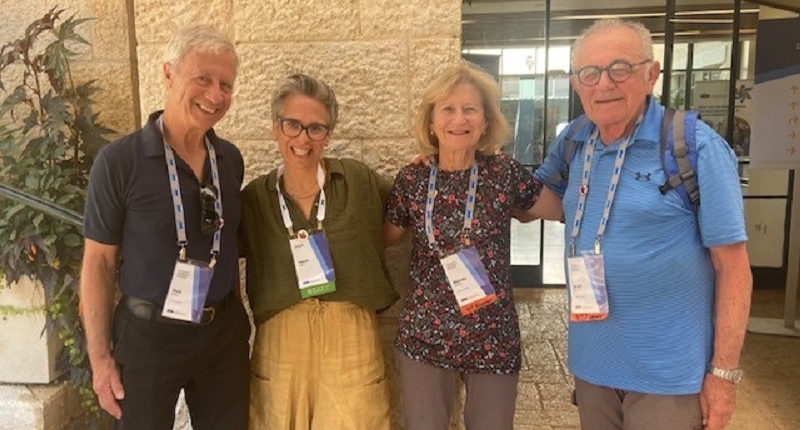By Mark Madras
In the company of a Canadian contingent, including fellow Holy Blossom members, I was fortunate to attend the Community Leadership Program at the Shalom Hartman Institute in Jerusalem from June 21-28, 2023.
While constituting a minority of the attendees, the Canadian participants made a meaningful and impactful contribution to the program, engaging in insightful questioning and dialogue among ourselves, with other learners and with faculty throughout the course. And what a thought-provoking and engaging program it was!
The Canadian contingent was led by Holy Blossom’s own Karen Kollins, now the Director of Canada for Hartman North America. To get a taste of what was to come at Hartman in Jerusalem, Karen organized a series of virtual classes for Canadian learners, held in advance of the trip, bringing us together on screen from across the country for our own classes with select members of the Hartman faculty.
Initiated we were, exposed to the Hartman faculty’s propensity to advance big ideas and raise even bigger questions, such as: do we identify with the “Judaism of Being” or the “Judaism of Becoming”; what happens to our Jewish selves when we are no longer united by the forces of anti-semitism; and what are the connections and perspectives that are foundational to the ties of Jewish peoplehood today. They were big topics and raised big questions, a great prelude for the journey to Jerusalem to take the deep dive, up close and in person with some of the leading educators and thinkers in our progressive Jewish universe.
Definitive answers, there were none. But disappointed I was not.
The program had several streams. There were plenary sessions that spoke to the challenges of commitment and obligation: in an era of liberalism and a culture of questioning, where leadership is challenged by decreasing deference to hierarchy, how do liberal Jews buy into the commitments and obligations mandated by the creed of Judaism? What role does truth play in the culture of faith; is it to be suspended to accept what might be considered the mythology that underpins the theology? What does the Torah teach us that is relevant to today’s culture of skepticism and empiricism?
And then there were breakout sessions guided by Hartman faculty, to enable small group explorations of the themes of the plenary sessions, either to process the ideas and materials referred to in the larger group sessions or to review and explore additional relevant sources and commentary texts. While Maimonides himself was not available to guide the perplexed, excerpts of his writings as well as biblical sources and the commentaries of others, did appear to enrich and further the discussions.
There were also breakout sessions, field trip excursions and evening sessions to explore current public policy issues facing Israel and the Jewish people, including the Judicial Overhaul, dissent and schisms within Israeli society past and present, and the challenges inherent in the creation of a shared society of Jewish and Palestinian citizens.
A most poignant and meaningful moment for me arose during my attendance at a Kabbalat Shabbat service at Kehilat Kol HaNeshama. The service closed with a prayer for peace. The congregation’s prayerful song expressed a heartfelt depth of longing for peace that was truly emotive and will remain with me forever. And then a most disturbing moment arose when I learned that subsequently the synagogue had been vandalized, allegedly by a gang of Haredi youth who destroyed posters and other items supportive of gay pride and the LGBTQ community. An immediate and very direct lesson on the schisms in society, the challenges to liberal Judaism, and one that reinforces the longing for peace not present in our time.
This was a truly impactful learning experience. The context of the setting – the beautiful Hartman Institute complex in Jerusalem – and the faculty of Hartman’s preeminent scholars, educators, and skilled communicators, made this an extraordinary and a most memorable experience. Until next year!!





